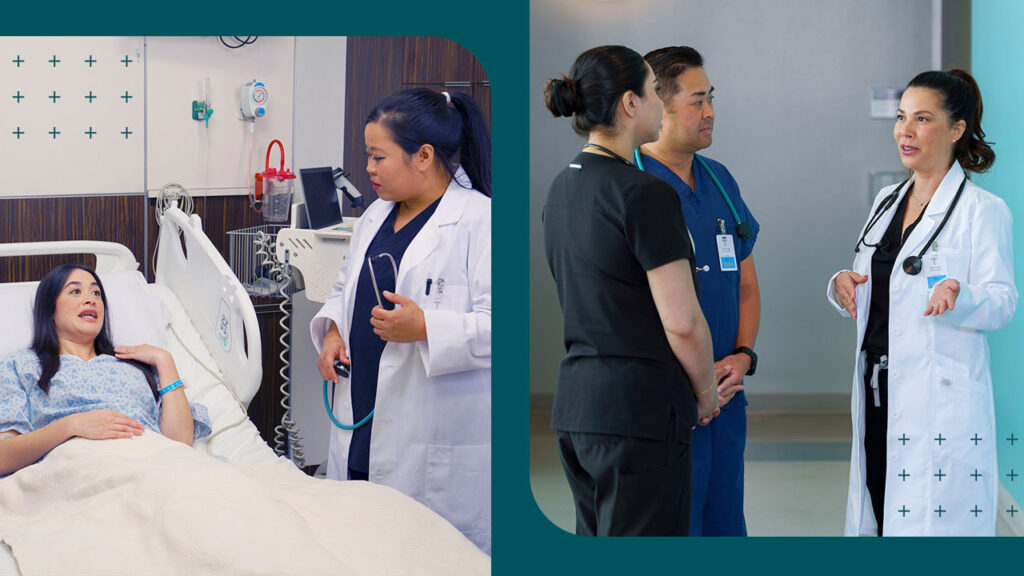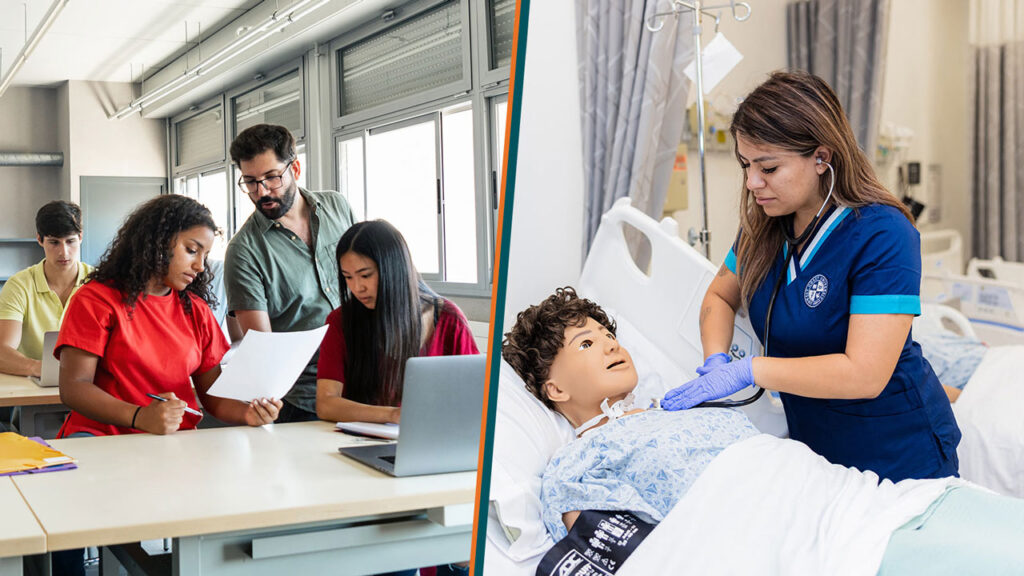Are you a working nurse who is looking to advance your education and specialize in a specific area of nursing? If so, then you may be a good fit for a Master or Science in Nursing (MSN) program that offers training in your area of interest.
Not only will an MSN specialty program provide you with the classroom training and clinical practicum you need to prepare for the role you’re looking for, but it will also help to prepare you for any required certification exams.
Before choosing what area to specialize in, it’s important to thoroughly research your options so you can choose the best fit for your career goals.
West Coast University’s online MSN program offers a number of different specializations that you may want to consider, including specializations for nurse practitioner and non-nurse practitioner roles. Join us as we explore the advanced nursing roles associated with each of WCU’s MSN degree specialties.
What Does a Family Nurse Practitioner Do?
If you enjoy working with patients of all different ages and providing care for a broad spectrum of non-emergency conditions and ailments, you may enjoy being a family nurse practitioner (FNP).
An FNP is an advanced practice registered nurse who delivers family-focused healthcare services, providing care for everyone from infants to elderly patients.
Some of the key duties of an FNP include:
- Performing physical exams
- Ordering or conducting diagnostic tests
- Educating patients on health promotion and disease prevention
- Creating treatment plans
- Prescribing medications
- Treating conditions, injuries, and illnesses that fall within primary care
- Maintaining patient records
Where do family nurse practitioners work?
FNPs can work in a variety of healthcare settings, including large healthcare systems, community health centers, private practices, and universities.
Which certifications do you need to become an FNP?
To become a family nurse practitioner, you need to take one of two certification exams offered by the American Nursing Credentialing Center (ANCC) and the American Academy of Nurse Practitioners (AANP). You can choose between the ANCC Family Nurse Practitioner board certification exam (FNP-BC) and the AANP Family Nurse Practitioner certification exam.
How long does it take to complete an MSN-FNP program?
At West Coast University, the Family Nurse Practitioner track of the Master of Science in Nursing program can be completed in the following timeline:
- Accelerated Pace: 20 months
- Working Professional Pace: 32 months
How many hours of clinical hours are required for an MSN-FNP program?
At WCU, this MSN specialization requires a total of 600 precepted clinical hours.
What Does an Adult-Gerontology Nurse Practitioner Do?
The role of an adult-gerontology nurse practitioner may be the right role for you if you prefer to treat older youth (patients ages 13 and up), adults, and senior citizens. As an NP who specializes in adult-gerontology, you can focus on either primary care (as an AGPCNP) or acute care (as an AGACNP).
Adult-gerontology NPs fill an important gap considering the rapid growth of America’s population of older adults. While adult-gerontology primary care nurses usually work more traditional daytime hours, NPs specializing in adult-gerontology acute care tend to work more non-traditional hours which may require availability for evening and weekend shifts.
AGPCNPs only perform duties related to primary care, which include the following for patients age 13 and older:
- Collecting patients’ medical histories
- Performing physical exams
- Ordering screening tests
- Interpreting diagnostic tests
- Administering pharmacological and nonpharmacological therapies that are appropriate for the patient’s age
- Overseeing the patient’s transition between care settings
- Educating patients and caregivers on best healthcare practices
- Evaluating caregiver competence
Meanwhile, AGACNPs only perform duties related to acute care, which include the following for patients age 13 and older:
- Stabilizing and treating patients with complex, acute conditions
- Monitoring patients’ conditions
- Developing multifaceted treatment plans for patients
- Delivering health maintenance and disease prevention education to patients and caregivers
Where do adult-gerontology NPs work?
AGPCNPs commonly work in long-term care settings, hospital-based clinics, and private practices whereas AGACNPs typically work in intensive care, trauma, or acute care units in hospitals. AGACNPs sometimes also work in specialty clinics and long-term care facilities.
Which certifications do you need to become an adult-gerontology NP?
To work as an adult-gerontology NP, you must complete one of the following exams:
For Adult-Gerontology Primary Care Nurse Practitioners:
- AGPCNP Certification Exam administered by the American Nurses Credentialing Center (ANCC)
- The AGNP Certification Exam administered by the American Academy of Nurse Practitioners Certification Board (AANPCB)
For Adult-Gerontology Acute Care Nurse Practitioners:
- Adult-Gerontology Acute Care Nurse Practitioner Certification Exam (AGACNP-BC® Exam) administered by the American Nurses Credentialing Center (ANCC)
- ACNPC-AG Certification Exam administered by the American Association of Critical-Care Nurses (AACN)
How long does it take to complete an Adult-Gerontology Nurse Practitioner
program?
Here are the timelines for the two adult-gerontology nurse practitioner specialties in the MSN program at WCU:
- Adult-Gerontology Primary Care Nurse Practitioner
- Accelerated Pace: 20 months
- Working Professional Pace: 32 months
- Adult-Gerontology Acute Care Nurse Practitioner
- Accelerated Pace: 16 months
- Working Professional Pace: 32 months
How many hours of clinical hours are required for an adult-gerontology nurse practitioner program?
At WCU, both the AGPCNP and AGACNP specializations in the MSN program require a total of 500 precepted clinical hours.
What Does a Psychiatric-Mental Health Nurse Practitioner Do?
A psychiatric-mental health nurse practitioner (PMHNP) is a nurse who specializes in caring for patients who have mental health conditions or issues with substance abuse. PMHNPs are a critical part of the care team that help individuals cope through challenges and improve their day-to-day lives.
Common duties of PMHNPs include:
- Providing therapy and prescribing medications
- Performing physical and psychosocial assessments
- Performing evaluations to assess the effectiveness of treatment
- Delivering emergency psychiatric care
Where do PMHNPs work?
Psychiatric-mental health nurse practitioners can work in a wide array of healthcare settings, including but not limited to:
- Hospitals
- Clinics
- Family medicine offices
- Private practices
- Group homes
- Schools
- Correctional facilities
- Public health settings
Which certification do you need to become a psychiatric-mental health nurse practitioner?
To become a PMHNP, you must pass the Psychiatric-Mental Health Nurse Practitioner Board Certification Exam (or the PMHNP-BC exam) exam administered by the American Nurses Credentialing Center (ANCC).
How long does it take to complete an MSN-PMHNP program?
The Psychiatric-Mental Health Nurse Practitioner track of WCU’s MSN program can be
completed according to the following timeline:
- Accelerated Pace: 20 months
- Working Professional Pace: 36 months
How many hours of clinical hours are required for an MSN-PMHNP program?
At WCU, this MSN specialization requires a total of 500 precepted clinical hours.
What Does a Nurse Educator Do?
Nurse educators are experienced nurses who provide educational instruction, training, and mentorship to other nurses in either clinical or academic settings. Nurse educators also often serve as preceptors to newly hired nurses and nursing students.
There is a great need for nurse educators, as there is currently a shortage of nursing faculty in the U.S. The role of a nurse educator may be a good fit for nurses who enjoy teaching, mentoring, and interacting with other nurses, and also helping to improve the quality of patient care.
Common nurse educator duties include:
- Teaching essential nursing skills to other other nurses and nursing students
- Designing nursing education programs and curricula
- Assessing students’ progress and feedback
- Overseeing student internships and on-site learning experiences
Where do nurse educators work?
Nurse educators work in clinical and academic settings, such as training on the clinical floor within a healthcare organization or through a formal educational institution.
Which certification do you need to become a nurse educator?
While it is not required to work as a nurse educator, you can obtain certification to demonstrate the depth of your knowledge and skills within this specialization of nursing. The National League for Nursing (NLN) offers two certifications that you can obtain by passing an exam: Certified Nurse Educator (CNE®) and Certified Clinical Academic Nurse Educator (CNE®cl).
How long does it take to complete an MSN-Nurse Educator program?
At WCU, the timeline for the MSN-Nurse Educator program includes the following:
- Accelerated Plus Pace: 8 months
- Accelerated Pace: 12 months
- Working Professional Pace: 24 months
What Does a Nurse Leader Do?
A nurse leader is a nurse who steps up to take on leadership roles in a variety of ways within their organization. They may be given certain responsibilities such as managing one or more care teams (such as through the role of a nurse manager or a director of nursing), evaluating and improving upon existing nursing practices within an organization, providing guidance and mentorship to other nurses, serving as a liaison in their community, serving on certain healthcare committees within their organization, or even getting involved in public policy initiatives.
According to the American Nurses Association, “a nurse leader role combines essential nursing, business, and leadership skills developed through ongoing learning.” Nurse leaders must be strong communicators, exhibit a high level of professionalism and ethics, and continually invest in their professional development so they are always up-to-date on the latest best standards and best practices in patient care.
Nurses who obtain advanced education in nurse leadership often go on to work in healthcare administration.
Where do nurse leaders work?
Nurse leadership positions can be found in all types of healthcare environments and are especially conducive to organizations with large care teams.
Which certification do you need to become a nurse leader?
While it is not required to work as a nurse leader, you may choose to obtain certification to demonstrate your nursing leadership knowledge and skills. Here are few certification options you may want to explore:
- Certified Nurse Manager and Leader (CNML®) by the American Organization for Nursing Leadership (AONL)
- Certified in Executive Nursing Practice (CENP®) by the AONL
- Clinical Nurse Leader (CNL) certification by the Commission on Nurse Certification (CNC)
- Nurse Executive Certification (NE-BC®) by the American Nurses Credentialing Center (ANCC)
How long does it take to complete an MSN-Nurse Leader program?
At WCU, the timeline for the MSN-Nurse Leader program includes the following:
- Accelerated Plus Pace: 8 months
- Accelerated Pace: 12 months
- Working Professional Pace: 24 months
How many hours of clinical hours are required for an MSN-Nurse Leader program?
At WCU, this MSN specialization requires a total of 135 precepted clinical hours.
Learn more about West Coast University’s MSN program and specializations.
WCU provides career guidance and assistance but cannot guarantee employment. The views and opinions expressed are those of the individuals and do not necessarily reflect the beliefs or position of the school or of any instructor or student.


